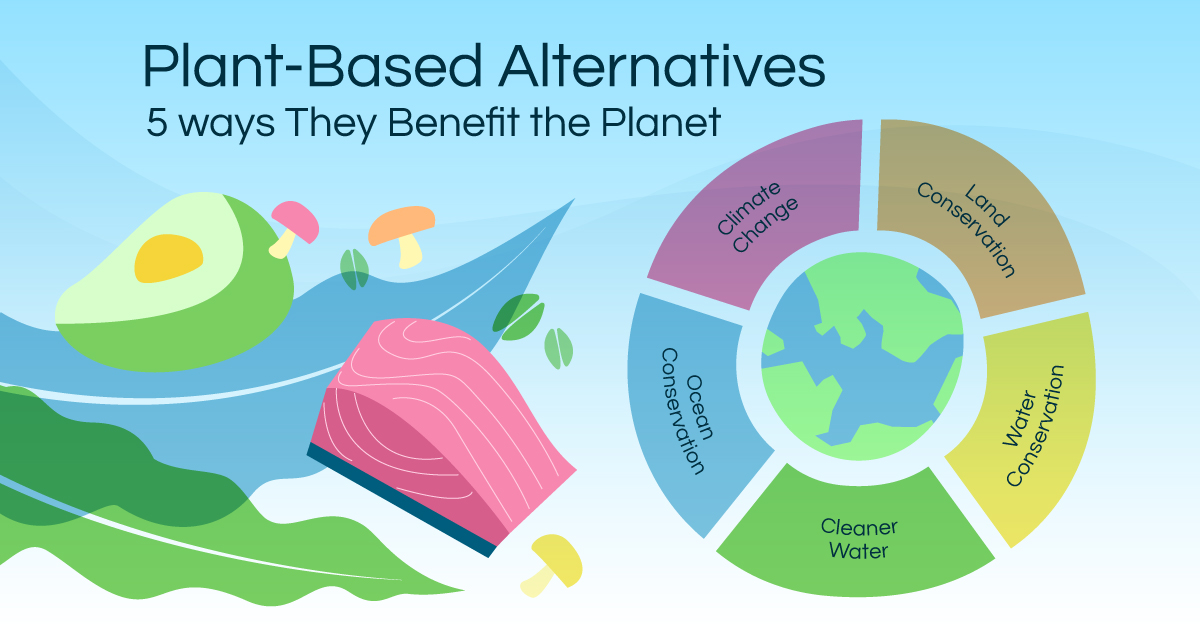Plant-based Alternatives: 5 Ways They Benefit the Planet
The following content is sponsored by Billy Goat Brands (CSE: GOAT) (“GOAT”).

Plant-based Alternatives: 5 Ways They Benefit the Planet
Over the past decade, people have become increasingly interested in plant-based diets. In fact, there has been a 600% increase in people turning vegan in the U.S. since 2014.
Because of this, the plant-based foods market could make up roughly 7.7% of the global protein market by 2030, with a value of over $162 billion, up from $29.4 billion in 2020.
Although initially promoted for their gambit of health benefits, recent studies have shown that switching to a plant-based diet has a list of environmental benefits too.
The following infographic by Billy Goat Brands (CSE: GOAT) (“GOAT”) explores the environmental impacts of conventional meat production and how plant-based alternatives can lessen this impact and be a viable dietary solution for the future.
Environmental Benefits of Plant-based Alternatives
Increased population growth has caused meat production to increase exponentially. The livestock sector is one of the most significant contributors to urgent environmental problems. Conventional meat production is responsible for 14.5% of the world’s greenhouse gases.
Water, land, and ocean conservation have become a major concern for livestock breeding and meat production. It also causes a loss of soil nutrients, leaving land unusable in the future.
Here are five ways in which the production of plant-based alternatives benefit the environment:
- Climate Change: The production of plant-based meats causes very low greenhouse gas emissions and can in fact reduce emissions caused by conventional meat production by 70%.
- Land Conservation: Switching to a plant-based diet could also reduce global agricultural land use from 4 to 1 billion hectares.
- Water Conservation: A plant-based diet can reduce water consumption by up to 50%, saving 14 trillion gallons of water annually.
- Cleaner Water: Creating plant-based alternatives does not require excessive spraying of chemicals and pesticides, reducing aquatic nutrient pollution.
- Ocean Conservation: Consumption of plant-based imitation fish can stop the practice of overfishing that has caused oceanic dead zones across the world.
Plant-based alternatives offer a solution to these problems. They produce minimal greenhouse gases and require a fraction of the cropland and water needed for conventional meat production.
Health Benefits of Consuming Plant-based Alternatives
Plant-based diets are considered to be naturally nutritious and healthy. For years, registered dietitians and food scientists have touted the perks of eating plants and cutting back on meat.
Here are some amazing benefits of choosing a plant-based diet:
Lower Your Blood Pressure
Several studies have shown that sticking with a plant-based diet can reduce blood pressure, reducing your risk of further health complications. A recent study also found that vegetarians had a 34% lower risk of developing hypertension than those who consume meat.
Prevent Type-2 Diabetes
Our diet and diseases like type 2 diabetes have had a long-standing link. Plant-based diets, especially when rich in high-quality plant foods, are associated with a substantially lower risk of developing type-2 diabetes by over 30%.
Provide Healthy Body BMI
Studies have shown that the mean BMI for vegans was 23.6, while for nonvegetarians, it was 28.8, which qualifies as overweight. The various fibers and antioxidants in plant-based foods reduce fatty lipids in the body and promote a healthy BMI.
Decrease Your Risk of Cancer
According to the American Institute for Cancer Research (AICR ), the best way to source cancer-protective nutrients, including fiber, vitamins, minerals, and phytochemicals, is to eat a diet rich in vegetables and fruit, grains, beans, nuts, seeds, and some animal foods.
Improve Brain Capacity
There is veritable proof that a plant-based diet may improve the cognitive functions of your body. In some rare cases, it is linked to enhancing impairments in Alzheimer’s patients and reducing the risk of dementia.
Most Popular Plant-based Alternatives
There are a variety of plant-based alternatives that are available for consumption in the market today. Meat and milk alternatives are the most popular types of current plant-based alternatives available. Many popular fast-food chains have now adopted using plant-based meats in their menus.
Similarly, in order to combat the extreme exploitation of fisheries worldwide, efforts are being made to create plant-based seafood alternatives for consumption.
Through brands like Sophie’s Kitchen, GOAT gives people the opportunity to invest in companies that offer healthy and environmentally conscious plant-based alternatives for consumption.
Learn more about investing in the ocean economy with GOAT by clicking here now.
-

 Sponsored3 years ago
Sponsored3 years agoMore Than Precious: Silver’s Role in the New Energy Era (Part 3 of 3)
Long known as a precious metal, silver in solar and EV technologies will redefine its role and importance to a greener economy.
-

 Sponsored7 years ago
Sponsored7 years agoThe History and Evolution of the Video Games Market
Everything from Pong to the rise of mobile gaming and AR/VR. Learn about the $100 billion video games market in this giant infographic.
-

 Sponsored8 years ago
Sponsored8 years agoThe Extraordinary Raw Materials in an iPhone 6s
Over 700 million iPhones have now been sold, but the iPhone would not exist if it were not for the raw materials that make the technology...
-

 Sponsored8 years ago
Sponsored8 years agoThe Industrial Internet, and How It’s Revolutionizing Mining
The convergence of the global industrial sector with big data and the internet of things, or the Industrial Internet, will revolutionize how mining works.


